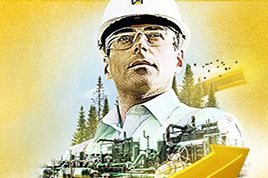If you already have an existing account with another Cat App, you can use the same account to sign in here.
One Account. All of Cat.
Your Caterpillar account is the single account you use to log in to select services and applications we offer. Shop for parts and machines online, manage your fleet, go mobile, and more.
Account Information
Site Settings
Security
Demystifying Oil and Gas
Debunking Myths and Clarifying Facts in the Petrochemical Industry
By Danielle Foelber | Posted October, 2023
Parts & Services
-
Parts & Services Home for Oil & Gas
Learn More -
Customer Value Agreements for Oil & Gas
Learn More -
Digital Services for Oil & Gas
Learn More -
Gas Compression Training
Learn More -
Finance and Warranty for Oil & Gas
Learn More -
Parts and Repair Options for Oil & Gas
Learn More -
Cat® Reman Solutions for Oil & Gas
Learn More
Sustainability
About
Curious to know the difference between oil and gas, or the sustainability efforts that are taking place in the industry? The following breakdown separates oil and gas facts and fiction.
Oil and Gas: What’s the Difference?
Many consider oil and gas to be the same products, however they are vastly different. In oil well production, a mixture of oil and gas is extracted from the ground and routed directly to processing equipment that will separate it or transport it to an export facility. The liquid is mainly crude oil, which is typically collected in tanks and processed for use in fuel applications. Extracted gasses are transferred to a gas processing plant to be separated into dry gas or wet gas.
Dry natural gas is used as fuel. The wet gas, however, is raw natural gas liquids (NGLs). NGLs’ similarity to a bag of M&Ms helps illustrate its characteristics. In a bag of M&Ms, many different colors ultimately create the bag of candy. With NGLs, many different components comprise this product including ethane, propane, butane, and pentanes.
Separating those components is important to many companies as those components have value and application to different products that impact our daily lives. For example, ethane is one of the major and most essential feedstocks for petrochemicals. Its structure is the simplest of all the hydrocarbons, and can be transformed into novel plastics that are used to manufacture various products, from milk bottles and similar containers to food packaging films to PVC piping.
Sustainability Innovation
Many wonder how companies are making meaningful strides in advancing the sustainability of oil and gas production. One method is advanced recycling, which collects plastic waste and converts it into paralysis oil which then becomes feedstock that produces products – without the degradation experienced with mechanical recycling. This supports a circular economy, which reduces waste and reduces the amount of new raw materials and energy to make products.
Oil and gas companies are also employing electrification in facilities to help reduce the greenhouse gas (GHG) emissions of their operations. Additionally, many companies in the industry are adopting alternative fuels, with some companies evaluating the feasibility of hydrogen, to help lower emissions.
Petrochemicals are an integral part of our modern lives. From insulation in our homes to adhesives and electrical components in phones to toothpaste and breakfast cereal packaging, petrochemicals make our standard of living possible. The industry is working hard to not only ensure awareness of the value of the products it helps create but also the commitment to further develop sustainable pathways for those products. A great deal of education is necessary to communicate the extent to which petrochemicals are used as well as the industry’s progress in employing multiple techniques to help reduce emissions in many areas.
For more insights to help increase operational efficiencies, listen to The Energy Pipeline Podcast, visit https://www.cat.com/en_US/campaigns/awareness/the-energy-pipeline.html
Related Content
-
The Cat® Blog
The Cat Blog is dedicated to sharing expert advice and industry knowledge to help our customers do the work better. Read our customer stories, tips and resources.
Learn More -
Oil & Gas Home
Discover Caterpillar oil and gas solutions and applications. Designed to be durable and efficient, our oil and gas generators are prime movers that deliver low operating costs.
Learn More -
Demystifying Oil and Gas: Petrochemicals and their applications
Hosts Jordan Yates & Bill Jensen interview Justine Smith, Senior Vice President at Chevron-Phillips Chemical to learn more about the manufacture of petrochemicals and all of their many uses. Brought to you by Caterpillar on OGGN – the largest and most listened-to podcast network for the energy industry.
Learn More



